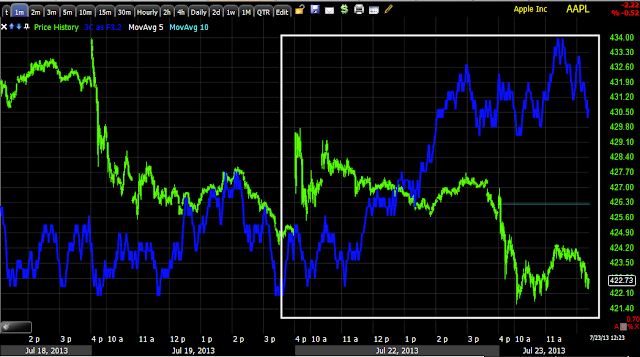I'll do my best to make this simple although there are dozens if not hundreds of moving parts that all go in to making the outcome a high probability outcome, but more than that it needs to be an excellent entry which means low risk.
For those of you using risk management like the 2% rule (which can be found linked at the upper top right side of the member's site) and are familiar with position sizing relative to risk on the position, then you know that the less risk there is per share, you can either increase position size (with caveats like maximum position size to guard against gaps and to diversify,
but not over-diversify which in my experience kills portfolio performance) or you can allow for wider stops and add to position size later, with shorts this can be done with very a favorable mechanism, I write about it in
"Making more than 100% in a short" , but this must be a true equity short, not a short/inverse ETF.
In any case, the idea is to get in at the best levels, but with the strongest underlying weakness, head fake moves tend to be the best option.
So here's the idea when looking at multiple timeframe analysis with ES (SPX E-mini Futures) as well as the VIX (custom DeMark inspired indicator that is very accurate with VIX signals).
First the VIX signal
as posted last night in the after market post.
This is the last VIX long signal in January near the lows leading to a move higher, typically they are even ,more timely than that one was. Yesterday we started the first long signal, today it continues, today the VIX also is +3.74% higher which is what I'd hope to see considering where we are in the market cycle.
The longer the timeframe, the more important the probability of the trend because it represents much larger underlying flow of funds, this 4 hour ES leading negative divergence with no accumulation at the bottom seen here (it was not strong enough to make it here) is a very bearish primary trend and ultimate trend probability.
ES 4 hr.
The 4 hour chart by itself just shows us what has been the predominate trend in underlying trade over a longer period and in much greater flows of money, but without multiple timeframe analysis it's just telling us that there's strong distribution, it's not giving us a probability of timing, it does give us a probability of how bad things will be when the collapse comes.
I did a study of all major tops since the start of the 20th century and many of the divergences now are worse than the 1929 divergence which you might be surprised to know, was not as big of a surprise to Wall St. as it was to main street, after the roaring 20's, smart money like JPM himself, were moving out of the market, apparently seeing a bubble that was no longer justified.
ES 2 hour gives us confirmation of the 4 hour chart and some more detail, it also helps to narrow down timing, if it were still positive it would not be likely we were close to a reversal point.
The ES 30 min chart is still a very serious timeframe as far as underlying trade, but it's more detailed and shows that there was strong distribution in to this recent top, July 8th still figures prominently as a date when something spooked the market.

ES 30 leading negative at the highs shows you what a head fake move is used for.
ES 15 min is negative, now we have a good chain of negative divergences, when more timeframes are saying the same thing, we are much closer to an actual pivot. However there are many other indications that go in to timing.
The 5 min chart now being negative is another nasty sign.
Only the 1 min chart for ES is positive, the strategic and tactical view here is that the main strategic view is the market is severely damaged and has little to hold it any longer.
Tactically speaking, because of the same things, any upside in the market makes for high probability, very low short entry positions.
As the 1 min fails, we have all timeframes negative, this along with some leading indicators is an outstanding signal in
multiple timeframe analysis, so this is not just an ordinary run of the mill day or week.






















































